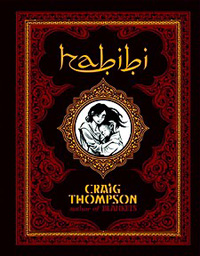 Craig Thompson: Habibi (Pantheon, 9/20/11)
Craig Thompson: Habibi (Pantheon, 9/20/11)
Can love survive great hardship through words and memory alone?
In Habibi — where community can be explained in the recurrence of one myth among many people, where stories and art become protection for the downtrodden, and where people can be bought, sold, and traded as easily as water — Craig Thompson explores the possibility of love and connection in a failed state. “Habibi” is Arabic for “my beloved,” but what does that mean when you can’t control your own fate, much less that of your beloved?
Thompson’s previous novel, Blankets, explored his own coming of age (and first experience of freedom and love) against the backdrop of a harsh and forbidding religious community. A lyrical look at the complex nature of community and survival through love, Blankets also explored the role of religious belief in myth-making. Habibi revisits similar territory, transporting the narrative to the Arabic world while still dealing with similar issues of freedom and bondage, love found in the strangest places, and the magical qualities of words and memory.
Habibi follows Dodola, a girl sold into slavery at a young age, and Zam, the younger boy she meets in captivity. They grow up together as friends despite their differences, endure separation and changes (both of their own making and forced on them), and eventually carve out a life in a world of slavery and uncaring governments. Although they must make hard choices in order to survive, Dodola and Zam remain connected, even in the face of lengthy physical separation.

